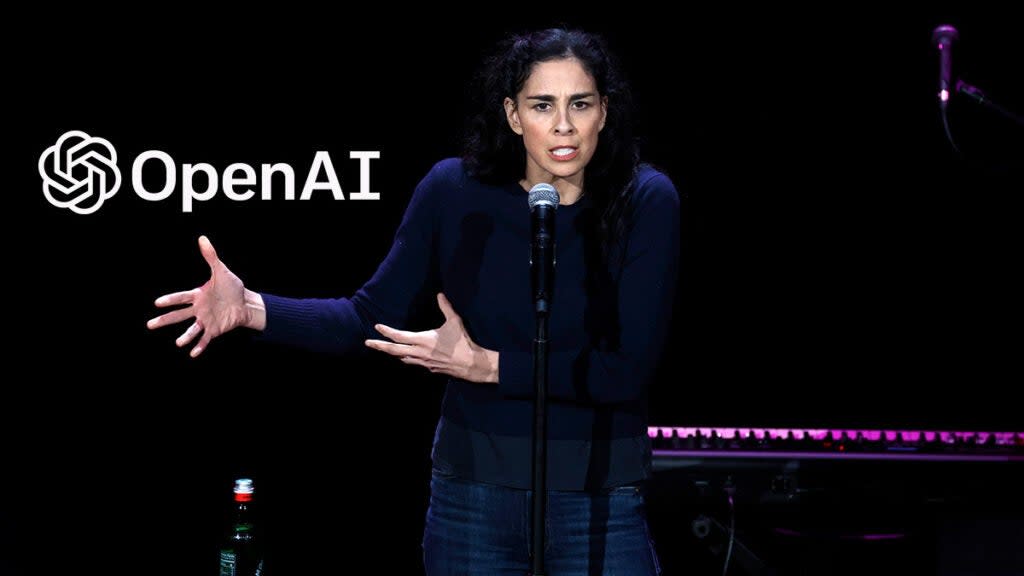Sarah Silverman’s OpenAI Lawsuit May Not Be Strong – but the Implications Are Huge | Analysis

What are the odds comedian and author Sarah Silverman and her two fellow plaintiffs win their copyright infringement lawsuit against OpenAI? Not great, according to experts. But regardless of how the suit pans out, it could either help bolster AI companies’ legal position or saddle them with new regulatory boundaries.
Silverman and two novelists, Christopher Golden and Richard Kadrey, are suing OpenAI for copyright infringement, asserting that the tech company used their copyrighted books’ contents for AI training without getting their consent or compensating them.
This is one of the first major high-profile cases to directly address the question of whether AI companies are free to train their systems and language models with whatever data they want or if stricter policies that favor copyright holders should be in place.
“Legally, no matter who prevails, the ‘fair use’ doctrine and definition of a derivative work will almost certainly be modified,” said Nicholas Holmes, a trademark associate at Caldwell Intellectual Property Law.
Also Read:
FTC to Investigate ChatGPT Maker OpenAI Over Consumer Harm
Since generative AI’s output is the result of all the works it has been trained on, one could argue that everything AI produces is in some degree a derivative work. Whether it’s fair use for a commercial product to analyze and learn from copyrighted data is a gray area. Resolving that will require determining how transformative AI’s output is and whether it affects the commercial market for copyright holders’ works.
“If OpenAI is able to prove that the output of the chatbots are transformative, and are not a substitute or replacement of Silverman’s work, it may be difficult for Silverman to prevail in this case,” Caldwell said.
Given how various jurisdictions are likely to define copyright’s fair use exception differently from each other, Caldwell expected a case could well make it to the Supreme Court in the future.
“I think the suit is weak, but the devil is in the details,” said Hunter Shkolnik, founding partner at Napoli Shkolnik PLLC. “The chilling effect this may have on the use of publicly available material and knowledge is staggering if she wins on all the broad claims she is making.”
Also Read:
Google Accused in Lawsuit of Stealing Americans’ Information to Fuel AI Initiatives
Few legal experts thought Silverman had a sure-fire shot at winning. One argument that came up: If a human being read her book “The Bedwetter” and that experience influenced their own work, are they then on the hook to recognize her contribution and pay her? In most cases, no. Hence, if AI training is treated like human learning, Silverman’s stance could be seen as too sweeping and unreasonably restrictive.
“I don’t know if the court will see the training of AI as a violation in this case, mainly because there isn’t any express use of the material in output,” said Derek Jacques, attorney at the Mitten Law Firm.
Regardless of how the case proceeds, this is a great move for Silverman’s personal brand, said social media expert Mark Weinstein, founder of MeWe, a social network. The proceedings could make strong fodder for her own material, be it stand-up routines or future books. And she’s already gotten buzz on social media for the move.
And experts acknowledged it’s not impossible that a court might ultimately end up siding with her and the other plaintiffs hoping to defend their copyrighted materials from artificial intelligence.
There’s mounting pressure on Big Tech in general to more clearly define where it gets its AI training data from and how it interacts with copyrighted content. Google’s currently facing a lawsuit on this very issue.
In a recent case, the Supreme Court sided with copyright holders and opted against giving transformative works heightened protections based on fair use. The case in question didn’t directly involve artificial intelligence, but the parallels are clear: Copyright holders are seeing their works used in ways they didn’t consent to, and they want the legal loopholes that enable such usage tightened.
Even if Silverman’s case isn’t the strongest, she’s at least barking up a popular tree already populated by creators and government entities pondering if AI companies need to be put in check. The same week she filed her lawsuit, the FTC began investigating OpenAI for its products including the popular ChatGPT service. That case involves chatbots’ habit of making up answers, but it points to a growing consensus among regulators that AI needs to be reined in.
Also Read:
Big AI Implications Lurk in the Supreme Court’s Andy Warhol Verdict | Analysis

